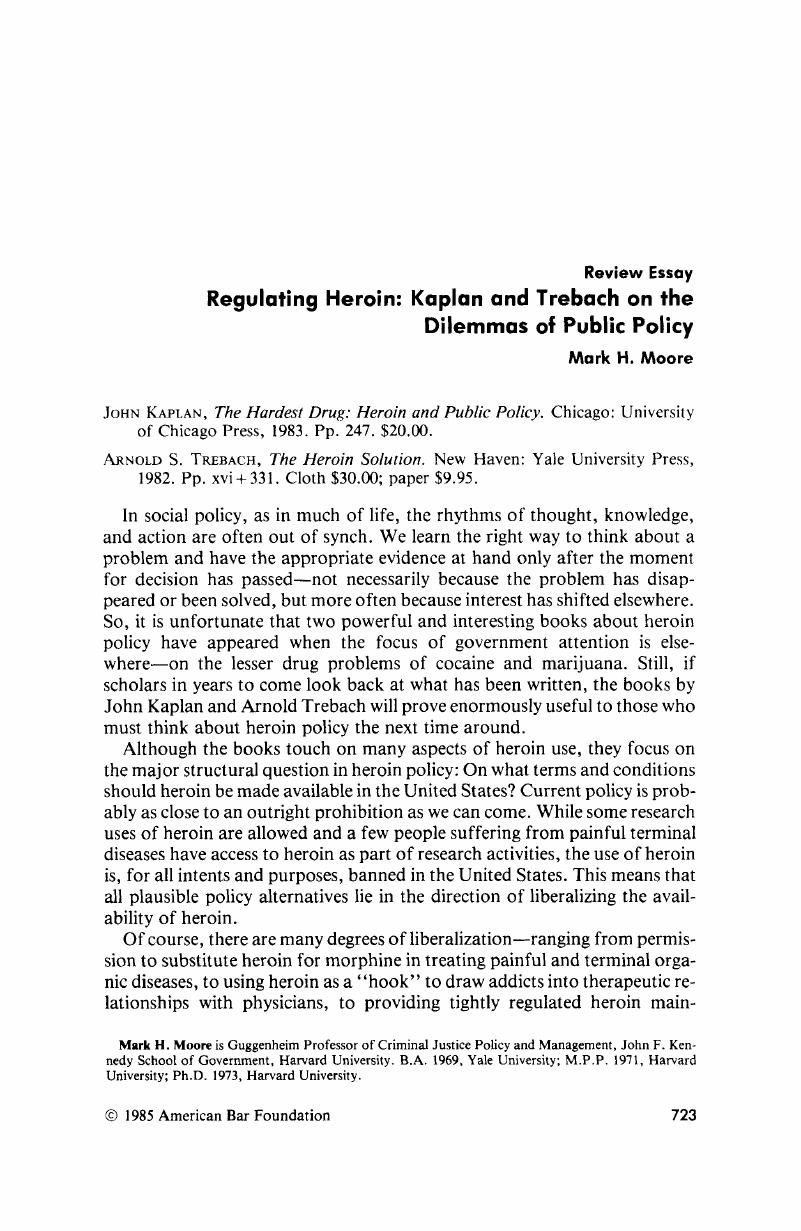No CrossRef data available.
Article contents
Regulating Heroin: Kaplan and Trebach on the Dilemmas of Public Policy
Published online by Cambridge University Press: 20 November 2018
Abstract

- Type
- Review Essay
- Information
- Copyright
- Copyright © American Bar Foundation, 1984
References
1 Charles E. Silberman, Criminal Violence, Criminal Justice (New York: Random House, 1978).Google Scholar
2 Edward J. Epstein, Agency of Fear: Opiates and Political Power in America (New York: Putnam, 1977).Google Scholar
3 . See, e.g., Zinberg, Norman E. & Jacobson, Richard B., The Natural History of ‘Chipping,’ 133 Am. J. Psychiatry 37 (1976); Lee N. Robins & George Murphy, Drug Use in a Normal Population of Young Negro Men, 57 Am. J. Pub. Health 1585 (1967); Lee N. Robins, Special Action Office for Drug Abuse Prevention, The Vietnam Veteran Returns, Monograph Series A, no. 2, item 857-B-3 (Washington, D.C.: Government Printing Office, 1974); and Bruce D. Johnson, Once an Addict, Seldom an Addict, 7 Con-temp. Drug Probs. 35, 4849 (1978).Google Scholar
4 The Rolleston Committee was appointed by the British Minister of Health in September 1924 to study the problems of drug abuse and to advise the government on the appropriate role of the medical profession in treating drug problems. The Committee was composed of a group of leading physicians and chaired by Sir Humphry Rolleston. The final report of the Committee was delivered in January 1925, but, according to Trebach, “its advice is ageless” (at 90).Google Scholar
5 . Webb v. United States, 249 U.S. 96 (1919).Google Scholar
6 The Brain Committee, which was composed almost entirely of doctors and, like the Rolleston Cornmittee, was appointed by the British Minister of Health, was designated in June 1958 and chaired by Sir Russell Brain, a distinguished physician. Trebach considers why another committee was appointed to study the same question studied by Rolleston (at 101–2); but, whatever the reasons, the Brain Committee completed its report in November 1960 and declared that no change was needed in the British approach to drug addiction. In 1964, under pressure from both private citizens and drug experts who were concerned with the mounting drug problems (Trebach at 108). the Minister of Health reconvened the Brain Committee, which recommended in 1%5 that Britain's drug policies needed revising.Google Scholar
7 Max Weber, Politics as a Vocation, in H. H. Gerth & C. Wright Mills, ed. and trans., From Max Weber: Essays in Sociology (New York: Oxford University Press, 1946).Google Scholar




